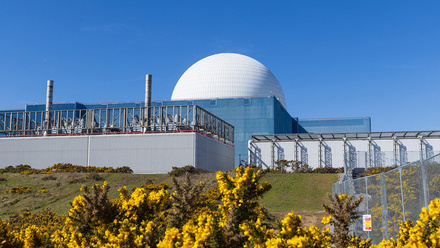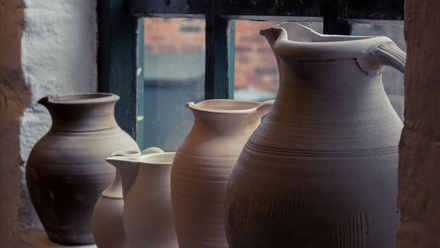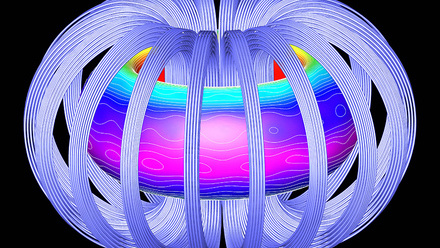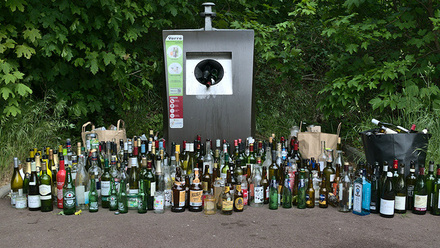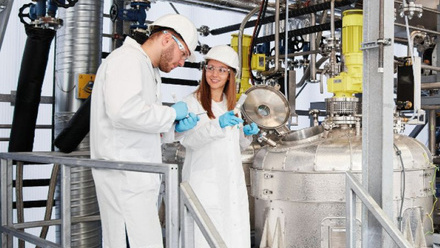GCRF START grants aim to raise global female representation in science research
Globally only 30% of science researchers are female - timed to coincide with UN International Day of Women and Girls in Science on 11 February, and to inspire more females to study and work in science, the GCRF START grant has announced the results of its three year project launched in March 2019.

Michelle Nyoni, part time PhD student at the University of the Witwatersrand, South Africa, and Chemistry lecturer at the Chinhoyi University of Technology (CUT), Zimbabwe. Michelle collaborates with the GCRF START grant in the field of energy materials
© Diamond Light SourceTo date, the project has directly collaborated with nearly 50 young African research students and given access to almost 100 synchrotron beamline sessions. Over half of START’s students are female scientists who are demonstrably changing perceptions and increasing the possibilities for women choosing long term STEM research careers.
‘Globally UNESCO figures show that only 30% of researchers are female and they occupy only 20% of STEM leadership positions. These figures are even lower in many countries in Africa underlining how important it is to challenge women’s under-representation. Young female African scientists are vital both for their research and as role models and mentors for the next generation. So we are really delighted to see many of the young women we collaborate with through the START grant, making great strides and achieving some incredible results in the fields of structural biology and energy materials,’ comments Prof. Chris Nicklin, Science Group Leader and Principal Investigator (PI) in the GCRF START (Synchrotron Techniques for African Research and Technology) grant programme.
GCRF START is a collaboration between Diamond Light Source, the UK’s national synchrotron, and higher education and research partners in the UK and Africa. It is funded by the Science and Technology Facilities Council under the UK government Global Challenge Research Fund programme.
The work is enabling and inspiring researchers from this, and the next, generation of Africans to choose careers in science and find solutions to some of the world’s most pressing health and environmental challenges. A key goal is to challenge the under-representation of women in science by providing access to world-class scientific facilities, funding, training, mentoring, and unique international collaborations.
One indicator of the success of the programme is how the energy materials sector, where traditionally the gender factor has been a barrier, has seen a growth in female representation. Additionally, all of these women participate in outreach and act as role models to inspire girls to choose STEM careers.
We have the power
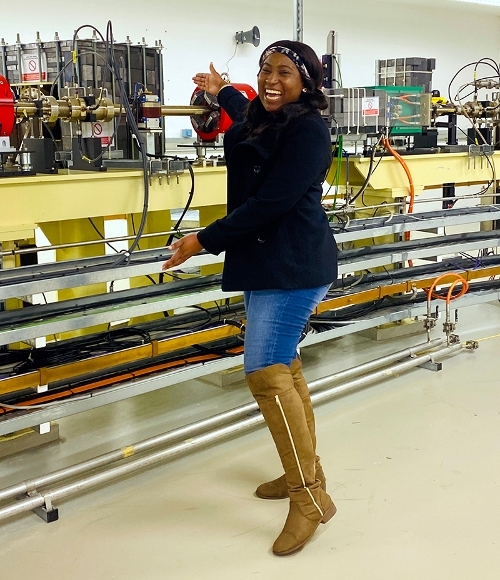
University of the Witwatersrand (South Africa) Energy materials PhD student, Gugulethu Nkala, on a workshop tour of UK’s national synchrotron, Diamond Light Source (Diamond), in March 2020. Credit: Gugulethu Nkala
© ©Diamond Light Source:One young scientist working with START, Gugulethu Nkala, is an Energy Materials PhD student from South Africa. The eldest of three daughters and first in her family to go to university, she says, ‘Seeing a black girl in science, makes girls see that there is someone, just like them, who has gone this far. We are breaking barriers that makes science seem unattainable, by being the link between science and society.’
Nkala is investigating new generation renewable energy storage systems in South Africa to help close the energy poverty gap, she is active in inspiring girls into STEM.
Her research on The Use of Fused Bimetal Phosphate-based Ceramics for Solid-State Electrolyte Applications focuses on improving renewable energy storage systems to make them more efficient, affordable, safe, and environmentally friendly.
Michelle Nyoni is studying energy materials to improve the performance of lithium-ion batteries for portable electronics and renewable energy sources to make them affordable and improve their environmental footprint to tackle climate change. Michelle is a chemistry lecturer in Zimbabwe.
As part of a growing number of female scientists in the Energy Materials Research Group at the University of the Witwatersrand, Nyoni is a part-time PhD student, teaching at the Chinhoyi University of Technology (CUT) in Zimbabwe and running her own consultancy bridging academia and industry in her spare time. Due to frequent load-shedding/power cuts, Michelle relies on a solar panel to provide her with a reliable source of light to be able to study at home.
She says, ‘I am very passionate about women in science and especially the young girl child having the opportunity to see women excel in science and see it is possible to make a difference. Science is not just for boys! I believe we should be motivating young women to get involved in science so they can help address the challenges in the world. My area of research is specifically looking at lithium-ion battery materials, specifically the cathode materials. I believe new generation batteries will be very useful for women all over the world, people all over the world. Being in the farming sector, when we don’t have power, it is such a challenge because production goes down. This is one of the key reasons why I have engaged in the type of research that I have been involved in.’
The GCRF START grant supports young scientists working on key climate, energy, health, and education challenges in line with the UN’s Sustainable Development Goals by building partnerships between world leading scientists in Africa and the UK and enabling them to work together on research using synchrotron science. The project focuses on developing and characterising new energy materials, for example in the development of solar cells or improving energy efficiency through novel catalysts, and structural biology to understand diseases and develop drug targets for better treatments and potential vaccines. The START programme is grant-funded through the UK’s Global Challenges Research Fund (GCRF) and delivered by UK Research and Innovation (UKRI) through the Science and Technology Facilities Council (STFC) and the UK’s national synchrotron facility, Diamond Light Source.



